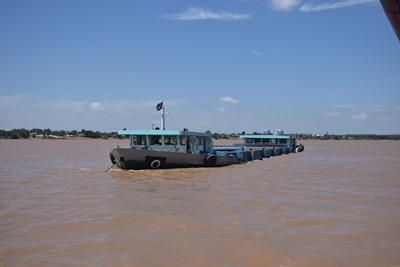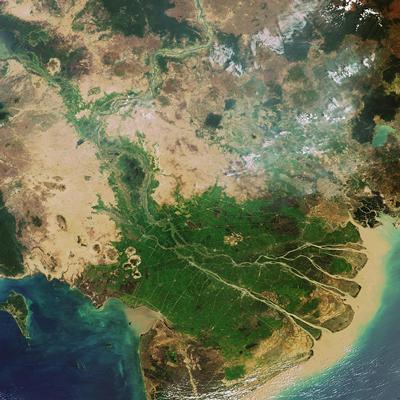Funding for Southampton geographers to address ‘hidden impact’ of COVID-19 pandemic

Southampton geographers, led by Associate Professor in Physical Geography Dr Julian Leyland, have received funding to address one of the ‘hidden impacts’ of the COVID-19 global pandemic.
The team from Geography and Environmental Science and GeoData have been awarded £166,000 from the Global Challenges Research Fund’s (GCRF) Newton Fund to investigate the impact of illegal sand mining in the Vietnamese Mekong delta.
The GCRF Newton Fund aims to promote the economic development and social welfare of partner countries to address the well-being of communities.
The team, which includes Professor Steve Darby and Professor Craig Hutton, will assess the impact of the surge in illegal sand mining activity during the COVID-19 lockdown on livelihoods and infrastructure from the induced bank erosion.
The work will build on extensive research that has already been carried out at Southampton into sediment delivery from the Mekong River and the effects of flood and droughts on the livelihoods in the Mekong delta.
Julian said: “South East Asia’s COVID-19 recovery is likely to be heavily reliant on an expanded construction industry which will create high demand for sand across the region and we know that illegal sand mining activity has increased in the Vietnamese Mekong delta during the coronavirus lockdown. This sand is routinely mined from large rivers and is normally subject to regulation. If it is removed more rapidly than river flows replace it, mining can trigger adverse impacts such as bank erosion threatening homes and infrastructure, or over-deepened delta channels that are prone to saltwater intrusion.

Julian said: “South East Asia’s COVID-19 recovery is likely to be heavily reliant on an expanded construction industry which will create high demand for sand across the region and we know that illegal sand mining activity has increased in the Vietnamese Mekong delta during the coronavirus lockdown. This sand is routinely mined from large rivers and is normally subject to regulation. If it is removed more rapidly than river flows replace it, mining can trigger adverse impacts such as bank erosion threatening homes and infrastructure, or over-deepened delta channels that are prone to saltwater intrusion.
“These issues are already affecting the Mekong delta, but the pandemic, and the associated challenge of enforcing regulations during lockdown, has led to an upsurge in unregulated sand mining, exacerbating the situation.”
The Southampton team, working with colleagues at the universities of Newcastle, Hull, as well as Can Tho University, the University of Mining and Geology and the Southern Institute of Water Resources Research in Vietnam, will quantify and predict the extent to which this increase in sand mining will further stimulate bank erosion in the forthcoming monsoon season when the river banks become saturated, and the subsequent dry season when bank collapse is usually triggered.
Julian added: “This work is urgent because of concerns that COVID-19-related mining has primed the system for severe erosion during the monsoon season. The results will guide remediation efforts and aid attempts to promote stronger regulation of sand mining, both post- coronavirus and for any future disrupting events that could potentially lead to an upsurge in illegal mining.
“We will use state-of-the-art remote sensing techniques to monitor mining activity in near real time via tracking of sand-laden boats from high resolution satellite imagery, as well as assessing the rates of bank erosion and the recent large scale movements of populations in the delta linked with the lockdown. We will also be working with our Vietnamese partners to collect field data and run models of bank erosion so that we can project future rates and impacts of erosion, transferring these onto maps of vulnerable people and infrastructure.
“We are well positioned to carry out this urgent work because we already have a portfolio of active research going on in the region which is looking at the effects of sediment movement and hydrological extremes. This new research will build on the networks of collaborators we currently have in Vietnam, and we will also be using resources such as poverty and flood risk maps that we are already actively developing.
“Our year-long research will result in opportunities to shape policy in the region and address one of the ‘hidden impacts’ of the COVID-19 crisis. We hope that by sharing our knowledge with key stakeholders, it can help mitigate the situation and avoid extraction in particularly sensitive areas of the river - providing a legacy that will hopefully last long after COVID-19.”
Researchers in Geography and Environmental Science at Southampton have been carrying out research on the Mekong River and in the delta for a number of years - looking at delivery of sediment and water and linked poverty and vulnerability – and the team recently published in Nature Sustainability some of the first observed rates of river bed lowering and projected bank erosion rates caused by sand mining on the Mekong in Cambodia.